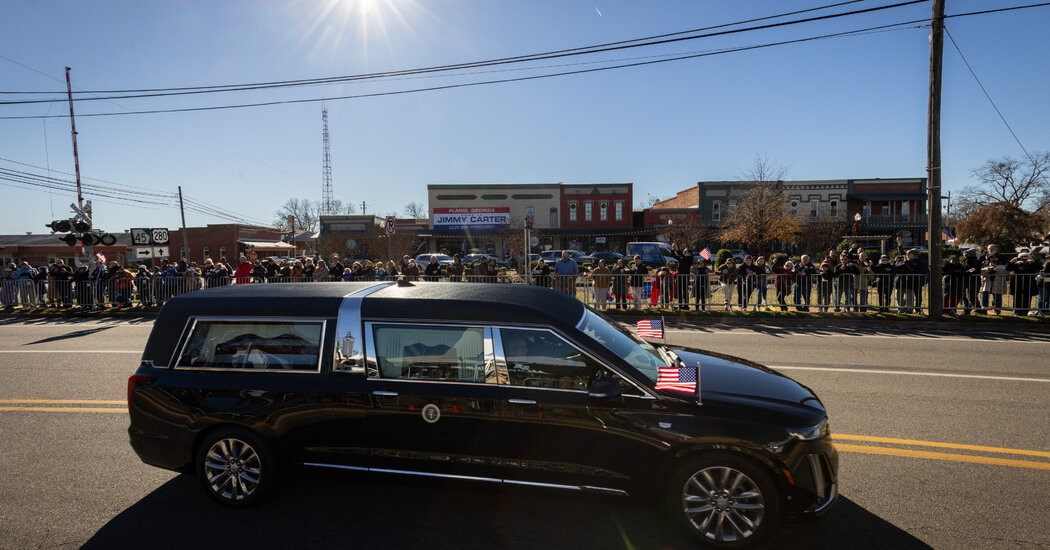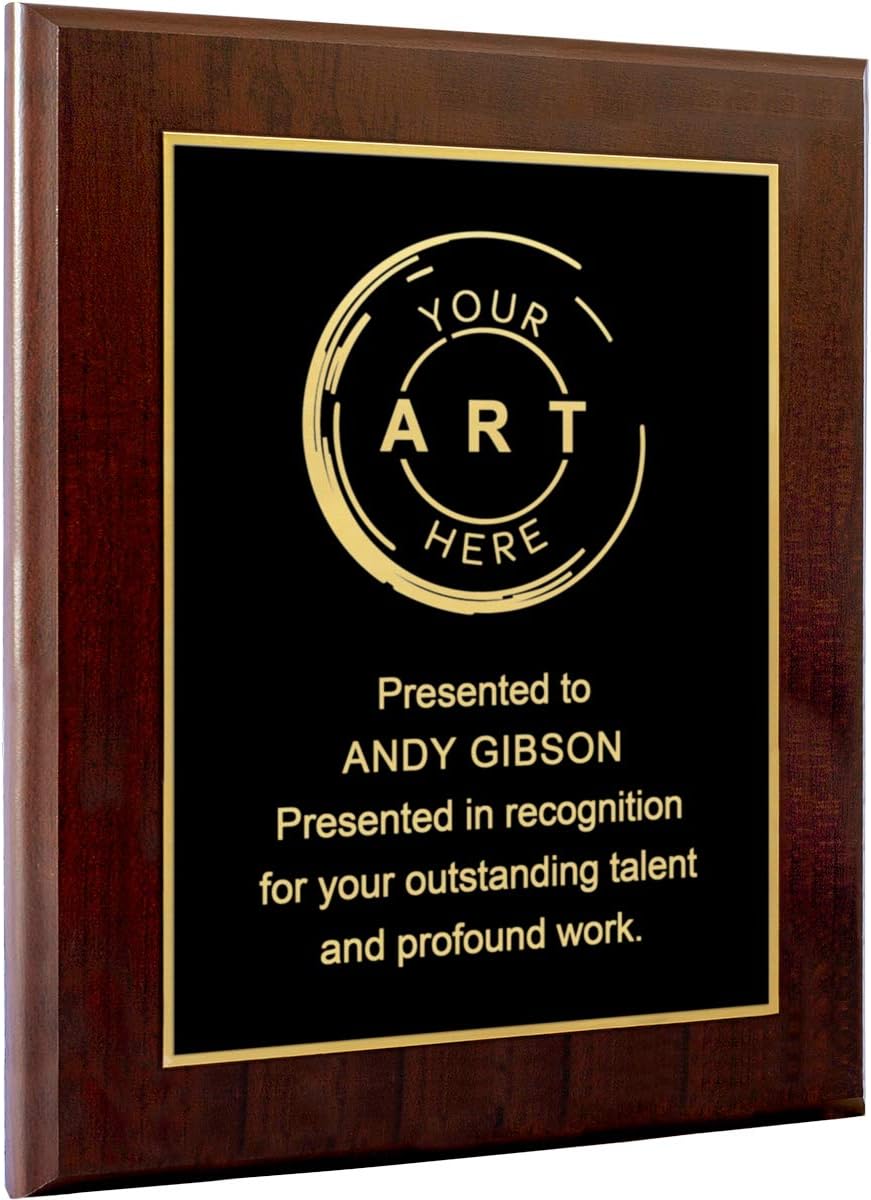In a few days, Jimmy Carter will be celebrated in a towering cathedral in Washington by fellow American presidents, noted humanitarians and other world leaders.
But before all of that, a hearse carrying the remains of Mr. Carter, the nation’s 39th president, paused on Saturday outside a farmhouse in Georgia. There, he raised chickens, helped his father tend to peanut crops and began a seemingly improbable, century-long journey that vaulted him from Plains, Ga., to the heights of political influence and along a globe-trotting mission to eradicate disease and protect democracy.
It was the first stop in a valedictory trek tracing the scope of a lengthy and varied life. The trek, like his life, began and will end in a patch of rural Georgia, where he was born and raised and where he died on Dec. 29 at 100.
In the days ahead, the series of memorial events will incorporate a discussion of the impression that Mr. Carter made on the world, including the legacy he left after a single term in the White House and a post-presidential life that also came to define him.
On Saturday, the journey began with a recognition of the places and people who had been instrumental in shaping him.
He wrote books lovingly recounting an upbringing in which he milked cows, learned to cook possums (the taste: “unique”) and drew water from a well. He also described the fraught racial dynamics of the segregated South and the enduring strains from the Civil War.
“I grew up in one of the families whose people could not forget that we had been conquered, while most of our neighbors were Black people whose grandparents had been liberated in the same conflict,” Mr. Carter wrote in “An Hour Before Daylight,” a memoir of his early life that was a finalist for a Pulitzer Prize in 2002. “Our two races, although inseparable in our daily lives, were kept apart by social custom, misinterpretation of Holy Scriptures and the unchallenged law of the land as mandated by the United States Supreme Court.”
The trip began at about 10 a.m. in Americus, Ga., after his remains were carried to the hearse by current and former special agents in charge of the Secret Service unit that protects Mr. Carter.
In addition to a stop at his boyhood home, now maintained by the National Park Service, the hearse passed through Plains, a town of some 500 people that had been his home base throughout life.
As the hearse and motorcade stopped at the sliver of country road running alongside the farmhouse outside Plains, bells were rung 39 times, a nod to his position in the lineup of American presidents.
It was a crisp morning, and people had come from near and far to perch along the route. Heather Baade, 54, had driven from Austin, Texas, and expressed a sentiment that many others shared: “I love Jimmy Carter.” She admired his ability to balance his deep Christian faith with secular leadership. She also believed that he “tried winning the heart of the whole country,” she said, “which we’re not seeing much of these days.”
Robert Garland, a retired Miami-Dade County sheriff’s deputy, was assigned to Mr. Carter’s security detail in 1991 when the former president visited Miami for his home-building work with Habitat for Humanity. “He was possibly our greatest president,” Mr. Garland, 64, said. “He led with dignity, honor and respect.”
The motorcade is set to meander from Plains through country routes lined by farmland and woods to reach the expansive interstates on the outskirts of Atlanta.
There, city and state leaders, including Gov. Brian Kemp, Georgia’s Republican governor, and Andre Dickens, the Democratic mayor of Atlanta, were scheduled to stand by outside the gold-domed Capitol. Those gathered were to pause for a moment of silence.
A tour through the streets of Atlanta will begin there, with the hearse carrying the former president through a city where he was an enduring presence. He rooted at Braves games. He would pop by Manuel’s Tavern, a bar that was a regular hangout for Georgia Democrats. And he worked countless hours at the Carter Center, the nonprofit he founded with his wife after leaving the White House.
The day’s travels are expected to end there, at the center situated in a tree-covered expanse in the northeastern part of Atlanta. A private service will be held in the afternoon, and he will be in repose beginning on Saturday evening and remain there until early Tuesday.
On Tuesday morning, the journey will continue toward Washington, where he will lie in state at the U.S. Capitol for a day and a half. A funeral is scheduled for Thursday morning at Washington National Cathedral, where President Biden is expected to deliver a eulogy. President-elect Donald J. Trump has indicated that he will attend.
From there, Mr. Carter will be carried back to Plains. He will be buried on Thursday beside his wife of 77 years, Rosalynn, just outside the house they built together in 1961.
Jimmy Carter, the 39th President of the United States, is being honored in a series of memorials that trace his life from his humble beginnings in Georgia to his time in the White House and beyond. The memorials, located in various places from his hometown of Plains, Georgia to Washington, D.C., celebrate Carter’s legacy as a humanitarian, peacemaker, and champion of human rights.
In Plains, visitors can tour the Jimmy Carter National Historic Site, which includes Carter’s childhood home, school, and farm. The site offers a glimpse into Carter’s early years and the values that shaped his presidency.
In Atlanta, the Carter Center serves as a hub for Carter’s post-presidential work in promoting democracy, human rights, and conflict resolution around the world. The center also houses the Jimmy Carter Library and Museum, which showcases artifacts and documents from Carter’s time in office.
In Washington, D.C., the Jimmy Carter Presidential Library and Museum provides a comprehensive look at Carter’s presidency, including key moments such as the Camp David Accords and the Iran Hostage Crisis. The museum also highlights Carter’s post-presidential efforts, including his work with Habitat for Humanity and the Carter Center.
From Georgia to Washington, these memorials offer a rich tapestry of Carter’s life and legacy, reminding visitors of the impact one man can have on the world. As we reflect on Carter’s contributions to our nation and the world, we are inspired to carry on his commitment to peace, justice, and human dignity.
Tags:
- Jimmy Carter memorials
- Georgia to Washington journey
- President Jimmy Carter
- Carter’s life milestones
- Georgia native in Washington
- Presidential legacies
- Washington DC memorials
- Jimmy Carter historical sites
- Georgia to Washington monuments
- Remembering Jimmy Carter
#Georgia #Washington #Memorials #Trace #Jimmy #Carters #Life




